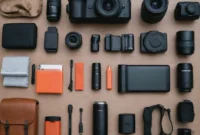How to prepare for a long-distance trip? With this comprehensive guide, you’ll embark on an extraordinary, meticulously planned, and executed journey, ensuring a seamless and enriching experience. From essential tasks to cultural immersion, we’ll cover every aspect to make your long-distance adventure unforgettable.
Packing Essentials
Packing for a long-distance trip requires careful planning and organization to ensure you have everything you need while traveling light and leaving room for souvenirs. Here are some tips for packing efficiently:
Start by creating a packing list tailored to your trip’s specific destination and duration. Consider the climate, activities, and cultural norms. Pack versatile items that can be mixed and matched to create multiple outfits, and choose lightweight, wrinkle-resistant fabrics to save space.
Maximize Space and Prevent Damage
Use packing cubes to organize items by category, such as clothing, toiletries, and electronics. This helps maximize space and keeps your belongings organized and easy to find.
Roll clothes instead of folding them to save space and prevent wrinkles. Pack delicate items in bubble wrap or tissue paper for extra protection.
Place heavier items at the bottom of your suitcase and lighter items on top to distribute weight evenly and prevent damage.
Pack Light and Leave Room for Souvenirs
Choose lightweight clothing and shoes to minimize the weight of your luggage. Consider wearing your heaviest shoes and jacket on the plane to save space in your suitcase.
Leave space in your suitcase for souvenirs and items you may purchase during your trip.
Consider shipping souvenirs home instead of packing them in your suitcase to avoid overweight baggage fees.
Budgeting and Money Management: How To Prepare For A Long-distance Trip

When planning a long-distance trip, budgeting and money management are crucial. It ensures sufficient funds for a comfortable and enjoyable experience while avoiding overspending or financial stress.
Estimate Travel Expenses and Create a Realistic Budget, How to prepare for a long-distance trip
Before embarking on your journey, estimating your travel expenses accurately is essential. Consider the following:
Transportation costs (flights, trains, buses, etc.)
Accommodation (hotels, guesthouses, hostels)
Activities and tours
Food and drinks
Visa fees (if applicable)
Travel Insurance
Emergency fund
Create a realistic budget that accounts for these expenses while allowing for some flexibility.
Explore Cost-Saving Tips
To optimize your travel budget, consider the following cost-saving tips:
- Book flights and accommodation in advance to secure discounts.
- Travel during the off-season or shoulder season for lower prices.
- Consider budget airlines or shared accommodations.
- Negotiate with local vendors for tours and activities.
- Take advantage of free activities such as walking tours or visiting museums with free admission.
- Cook meals instead of dining out regularly.
- Utilize public transportation or ride-sharing services.
Currency Exchange and Money Management
- Research currency exchange rates and compare different options.
- Consider using a travel credit card with no foreign transaction fees.
- Carry a mix of cash and cards for convenience and security.
- Be aware of exchange rate fluctuations and potential scams.
- Keep a record of your expenses for easy tracking and budgeting.
Travel Documents and Visas
Ensuring you have the necessary travel documents and visas is crucial for a smooth long-distance trip. These documents prove your identity, nationality, and authorization to enter and stay in foreign countries.
Organizing your essential travel documents, including your passport, visa, and insurance policies, is necessary in a secure and easily accessible location. Consider making copies of these documents and storing them separately from the originals in case of loss or theft.
Visa Requirements and Application Procedures
Visa requirements vary depending on your destination and nationality. Research the visa requirements for your intended destinations well in advance and initiate the application process promptly to avoid delays.
Visa applications typically involve submitting documents, such as your passport, a visa application form, proof of financial means, and a passport-sized photograph. Some countries may also require an interview as part of the application process.
It’s advisable to consult the embassy or consulate of the countries you’ll be visiting for specific visa requirements and application procedures. You can also seek assistance from a travel agent or visa service provider to ensure a seamless visa application process.
Wrap-Up
As you on long-distance trips, remember the meticulous planning, thoughtful packing, and cultural sensitivity that will make your journey a transformative experience. Embrace the unknown, immerse yourself in local customs, and create memories that will last a lifetime.
Questions Often Asked
What are some essential items to pack for a long-distance trip?
Consider the destination and duration of your trip when packing. Include comfortable clothing, essential toiletries, a first-aid kit, and necessary electronics.
How can I stay healthy during a long-distance trip?
Stay hydrated, eat nutritious meals, and get enough rest. Research any necessary vaccinations or health precautions for your destination and consult a healthcare professional.
What are some tips for saving money on a long-distance trip?
Travel during the off-season, consider budget airlines or trains, and look for discounts on accommodation and activities. Cook meals instead of dining out and use free Wi-Fi to avoid roaming charges.





